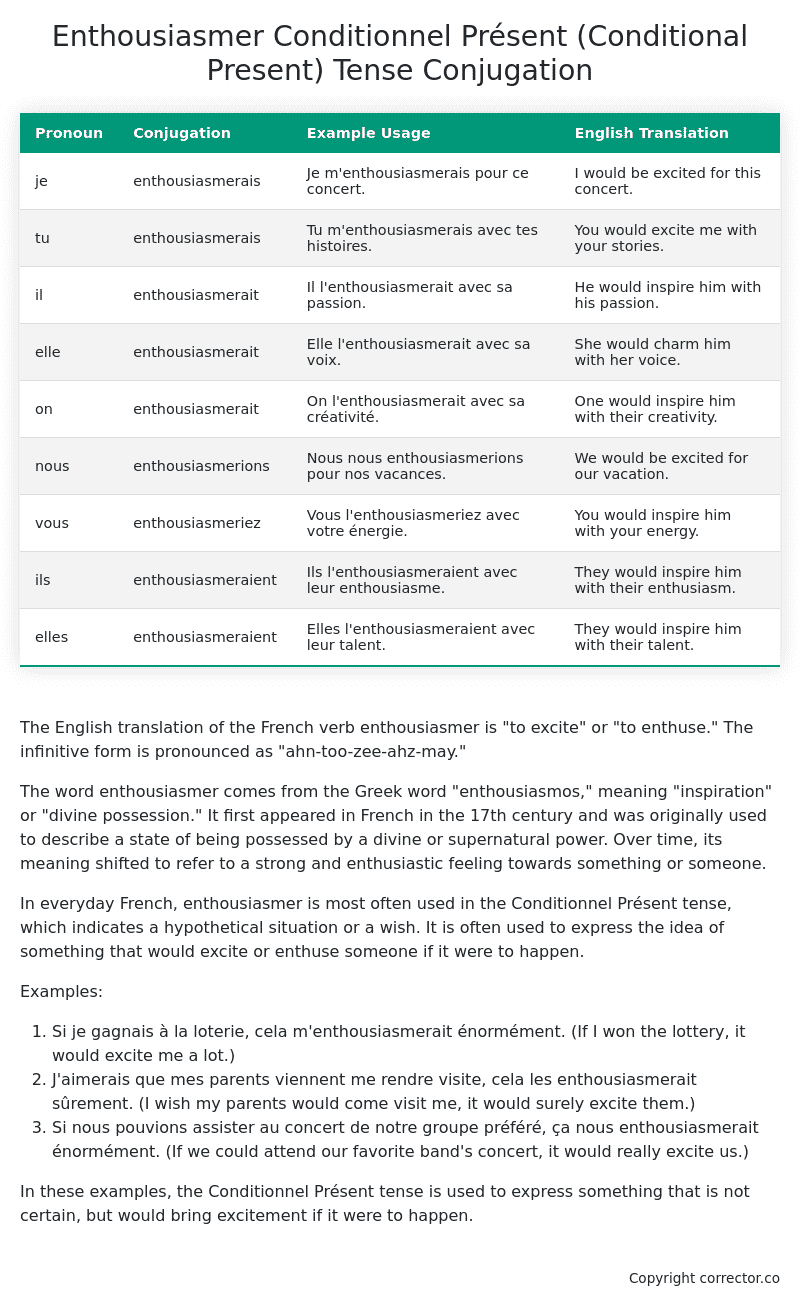Conditionnel Présent (Conditional Present) Tense Conjugation of the French Verb enthousiasmer
Introduction to the verb enthousiasmer
The English translation of the French verb enthousiasmer is “to excite” or “to enthuse.” The infinitive form is pronounced as “ahn-too-zee-ahz-may.”
The word enthousiasmer comes from the Greek word “enthousiasmos,” meaning “inspiration” or “divine possession.” It first appeared in French in the 17th century and was originally used to describe a state of being possessed by a divine or supernatural power. Over time, its meaning shifted to refer to a strong and enthusiastic feeling towards something or someone.
In everyday French, enthousiasmer is most often used in the Conditionnel Présent tense, which indicates a hypothetical situation or a wish. It is often used to express the idea of something that would excite or enthuse someone if it were to happen.
Examples:
- Si je gagnais à la loterie, cela m’enthousiasmerait énormément. (If I won the lottery, it would excite me a lot.)
- J’aimerais que mes parents viennent me rendre visite, cela les enthousiasmerait sûrement. (I wish my parents would come visit me, it would surely excite them.)
- Si nous pouvions assister au concert de notre groupe préféré, ça nous enthousiasmerait énormément. (If we could attend our favorite band’s concert, it would really excite us.)
In these examples, the Conditionnel Présent tense is used to express something that is not certain, but would bring excitement if it were to happen.
Table of the Conditionnel Présent (Conditional Present) Tense Conjugation of enthousiasmer
| Pronoun | Conjugation | Example Usage | English Translation |
|---|---|---|---|
| je | enthousiasmerais | Je m’enthousiasmerais pour ce concert. | I would be excited for this concert. |
| tu | enthousiasmerais | Tu m’enthousiasmerais avec tes histoires. | You would excite me with your stories. |
| il | enthousiasmerait | Il l’enthousiasmerait avec sa passion. | He would inspire him with his passion. |
| elle | enthousiasmerait | Elle l’enthousiasmerait avec sa voix. | She would charm him with her voice. |
| on | enthousiasmerait | On l’enthousiasmerait avec sa créativité. | One would inspire him with their creativity. |
| nous | enthousiasmerions | Nous nous enthousiasmerions pour nos vacances. | We would be excited for our vacation. |
| vous | enthousiasmeriez | Vous l’enthousiasmeriez avec votre énergie. | You would inspire him with your energy. |
| ils | enthousiasmeraient | Ils l’enthousiasmeraient avec leur enthousiasme. | They would inspire him with their enthusiasm. |
| elles | enthousiasmeraient | Elles l’enthousiasmeraient avec leur talent. | They would inspire him with their talent. |
Other Conjugations for Enthousiasmer.
Le Present (Present Tense) Conjugation of the French Verb enthousiasmer
Imparfait (Imperfect) Tense Conjugation of the French Verb enthousiasmer
Passé Simple (Simple Past) Tense Conjugation of the French Verb enthousiasmer
Passé Composé (Present Perfect) Tense Conjugation of the French Verb enthousiasmer
Futur Simple (Simple Future) Tense Conjugation of the French Verb enthousiasmer
Futur Proche (Near Future) Tense Conjugation of the French Verb enthousiasmer
Plus-que-parfait (Pluperfect) Tense Conjugation of the French Verb enthousiasmer
Passé Antérieur (Past Anterior) Tense Conjugation of the French Verb enthousiasmer
Futur Antérieur (Future Anterior) Tense Conjugation of the French Verb enthousiasmer
Subjonctif Présent (Subjunctive Present) Tense Conjugation of the French Verb enthousiasmer
Subjonctif Passé (Subjunctive Past) Tense Conjugation of the French Verb enthousiasmer
Subjonctif Imparfait (Subjunctive Imperfect) Tense Conjugation of the French Verb enthousiasmer
Conditionnel Présent (Conditional Present) Tense Conjugation of the French Verb enthousiasmer (this article)
Conditionnel Passé (Conditional Past) Tense Conjugation of the French Verb enthousiasmer
L’impératif Présent (Imperative Present) Tense Conjugation of the French Verb enthousiasmer
L’infinitif Présent (Infinitive Present) Tense Conjugation of the French Verb enthousiasmer
Struggling with French verbs or the language in general? Why not use our free French Grammar Checker – no registration required!
Get a FREE Download Study Sheet of this Conjugation 🔥
Simply right click the image below, click “save image” and get your free reference for the enthousiasmer Conditionnel Présent tense conjugation!

Enthousiasmer – About the French Conditionnel Présent (Conditional Present) Tense
Formation
Common Everyday Usage Patterns
Expressing Polite Requests
Expressing Hypothetical Situations
Expressing Doubt or Uncertainty
Interactions with Other Tenses
Present Tense
Past Tense
Future Tense
Conditional Perfect
Summary
Want More?
I hope you enjoyed this article on the verb enthousiasmer. Still in a learning mood? Check out another TOTALLY random French verb conjugation!


